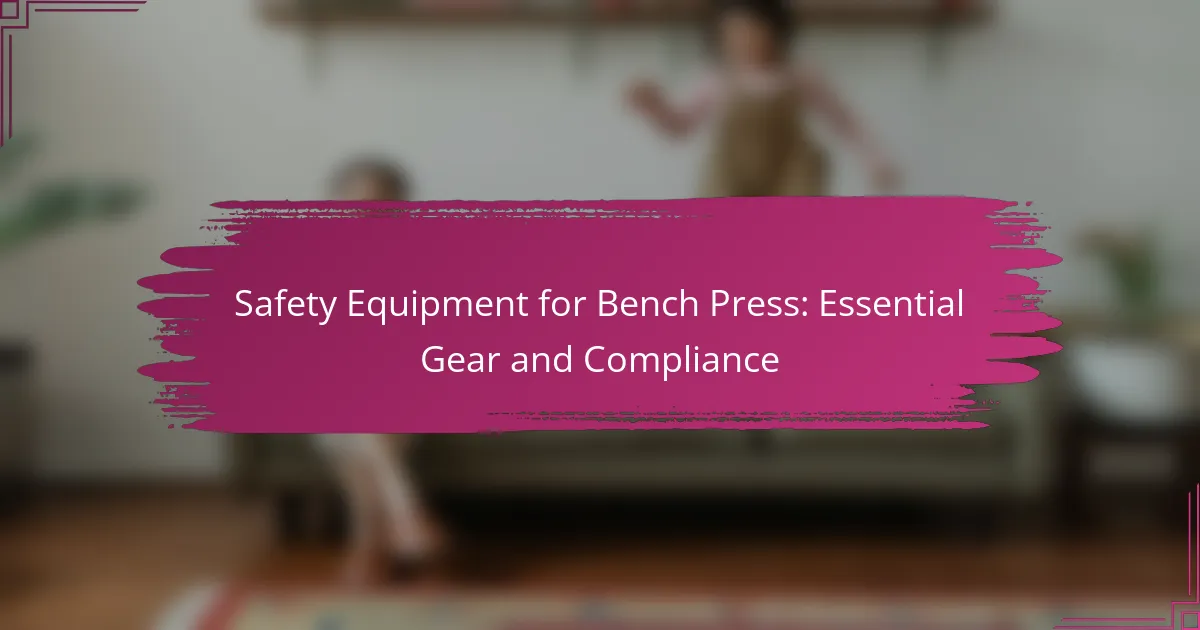When engaging in bench press workouts, essential safety equipment is crucial for preventing injuries and ensuring a secure lifting environment. Key items such as weightlifting gloves, safety bars, and spotter arms play a vital role in maintaining control and minimizing risks. Selecting the appropriate gear involves considering your weight, experience, and gym setup while adhering to safety compliance standards that guarantee the reliability and effectiveness of the equipment.

What safety equipment is essential for bench press?
Essential safety equipment for bench press includes gear that protects the lifter from injury and ensures a safe lifting environment. Key items like weightlifting gloves, safety bars, and spotter arms help maintain control and prevent accidents during workouts.
Weightlifting gloves
Weightlifting gloves provide grip support and protect the hands from calluses and injuries during bench press exercises. They often feature padded palms and breathable materials, enhancing comfort and stability while lifting weights.
When selecting gloves, consider factors such as fit, material, and grip texture. A snug fit ensures that the gloves do not slip during lifts, while durable materials can withstand regular use.
Bench press safety bars
Bench press safety bars are crucial for preventing injuries in case of a failed lift. These bars are adjustable and positioned at a height that allows the barbell to rest safely if the lifter cannot complete the lift.
Ensure that the safety bars are compatible with your bench and can support the weight you intend to lift. Regularly check for wear and tear to maintain their effectiveness and reliability.
Spotter arms
Spotter arms are an essential addition to a bench press setup, providing an extra layer of safety. They act as a backup in case the lifter loses control of the barbell, allowing it to rest safely without causing injury.
When using spotter arms, adjust them to the appropriate height based on your lifting position. This ensures they will catch the barbell effectively if needed, enhancing your safety during workouts.
Resistance bands
Resistance bands can be used in conjunction with bench pressing to improve stability and control. They help in maintaining proper form and can be used for warm-ups or as part of a progressive resistance strategy.
Incorporate bands into your routine by attaching them to the barbell or the bench. This adds variable resistance, which can enhance strength and muscle engagement throughout the lift.
Weight plates with secure locking mechanisms
Weight plates equipped with secure locking mechanisms are vital for preventing accidents during bench press. These mechanisms ensure that the plates do not slide off the barbell, maintaining stability throughout the lift.
Choose plates that feature reliable locking systems, such as spring clips or screw-on collars. Regularly inspect these mechanisms for wear to ensure they function correctly, providing a safe lifting experience.

How do I choose the right bench press safety gear?
Choosing the right bench press safety gear involves assessing your weight, experience, and gym setup while ensuring compliance with safety standards. Prioritize equipment that enhances safety and fits your specific training environment.
Consider user weight and experience level
Your weight and experience level are crucial factors in selecting bench press safety gear. Beginners may require more supportive equipment, such as safety straps or spotter arms, to prevent accidents. Advanced lifters might opt for minimal gear to maintain mobility while still ensuring safety.
For example, if you weigh over 100 kg and are an experienced lifter, consider using heavier-duty safety equipment designed for high loads. Conversely, lighter users or novices might find standard safety gear sufficient.
Evaluate equipment compatibility with existing gym setup
Ensure that the safety gear you choose is compatible with your current gym setup. This includes checking the dimensions of your bench and rack to confirm that safety bars or straps can be securely attached without obstructing your workout.
For instance, if you have a compact home gym, look for adjustable safety arms that can fit various bench sizes. If you’re using commercial gym equipment, verify that the safety gear meets the specifications of the machines in use.
Check for safety certifications
Safety certifications are essential to ensure that your bench press gear meets industry standards. Look for certifications from recognized organizations, such as ASTM or ISO, which indicate that the equipment has undergone rigorous testing for safety and durability.
When purchasing gear, check product labels or manufacturer websites for certification details. Avoid using equipment without proper certifications, as it may not provide adequate protection during heavy lifts.

What are the compliance standards for bench press safety equipment?
Compliance standards for bench press safety equipment ensure that the gear used in weightlifting meets specific safety and performance criteria. These standards help protect users from injury and ensure the equipment is reliable during workouts.
ASTM standards for weightlifting equipment
The American Society for Testing and Materials (ASTM) sets forth standards that govern the safety and performance of weightlifting equipment, including bench presses. These standards cover aspects such as material quality, structural integrity, and user safety features.
For example, ASTM F2276 outlines the performance requirements for strength training equipment, ensuring that products can withstand specified loads without failure. Manufacturers must test their equipment to these standards to ensure compliance and safety for users.
ISO safety regulations for gym equipment
The International Organization for Standardization (ISO) provides global safety regulations for gym equipment, including bench presses. ISO 20957 specifies safety requirements for fitness equipment, focusing on user safety, stability, and durability.
Compliance with ISO standards helps manufacturers produce equipment that minimizes risks, such as tipping or structural failure. Gym owners should verify that their equipment meets these ISO standards to ensure a safe environment for all users.

Where can I purchase bench press safety equipment in the US?
You can purchase bench press safety equipment in the US from various local and online sources. It’s essential to choose reliable retailers that offer quality gear to ensure your safety during workouts.
Local sporting goods stores
Local sporting goods stores are a great option for purchasing bench press safety equipment. Stores like Dick’s Sporting Goods, Academy Sports + Outdoors, and local fitness specialty shops often carry a range of safety gear, including weight collars, safety bars, and spotting belts.
When visiting these stores, you can physically inspect the equipment and ask staff for recommendations based on your specific needs. Look for products that meet safety standards and have good customer reviews to ensure reliability.
Online retailers like Amazon and Rogue Fitness
Online retailers such as Amazon and Rogue Fitness offer a wide selection of bench press safety equipment, often at competitive prices. These platforms provide customer reviews and detailed product descriptions, helping you make informed decisions.
Shopping online allows you to compare different brands and models easily. Be sure to check shipping costs and return policies, as they can vary significantly. Look for items that have been certified for safety to ensure you are getting quality equipment.

What are the benefits of using safety equipment for bench press?
Using safety equipment for bench press significantly reduces the likelihood of injury while enhancing overall workout effectiveness. This gear provides crucial support during lifts, allowing for safer training sessions and improved performance outcomes.
Reduces risk of injury
Safety equipment such as spotter arms, safety bars, and bench press racks are designed to catch weights if they slip or if the lifter loses control. This equipment can prevent serious injuries, particularly when lifting heavy weights, which is common in bench pressing.
Additionally, using safety gear can help lifters train alone without the constant need for a spotter, making workouts more flexible. However, it’s essential to ensure that the equipment is properly set up and adjusted to the lifter’s height and weight to maximize its protective benefits.
Enhances workout performance
Incorporating safety equipment can lead to improved workout performance by allowing lifters to focus on their form and technique without the fear of injury. With the added security of safety gear, individuals may feel more confident to push their limits and increase their weights gradually.
Furthermore, using safety equipment can facilitate a more efficient workout routine. Lifters can spend less time worrying about safety and more time concentrating on their lifting strategy, ultimately leading to better results over time. Regularly assessing and upgrading safety gear can also contribute to ongoing performance improvements.

How much does bench press safety equipment cost?
The cost of bench press safety equipment can vary widely based on the type and brand, typically ranging from low tens to a few hundred dollars. Investing in quality safety gear is crucial for preventing injuries and ensuring a secure workout environment.
Price range for basic safety gear
Basic bench press safety gear includes items like safety bars, spotter arms, and weight collars. Prices for these essentials generally start around $20 and can go up to $150, depending on the material and brand. For example, a pair of safety collars may cost around $20, while more robust safety bars can reach $100 or more.
When selecting basic safety gear, consider durability and compatibility with your existing bench setup. Investing in reliable equipment can enhance safety and performance during workouts.
Cost comparison of brands like Body-Solid and CAP Barbell
Body-Solid and CAP Barbell are popular brands known for their bench press safety equipment. Body-Solid products tend to be priced higher, reflecting their reputation for durability and professional-grade quality, with items often ranging from $100 to $300. In contrast, CAP Barbell offers more budget-friendly options, typically priced between $30 and $150.
When comparing these brands, assess your specific needs, such as the frequency of use and the weight capacity required. While Body-Solid may provide longer-lasting equipment, CAP Barbell can be a great choice for home gym enthusiasts on a budget.



